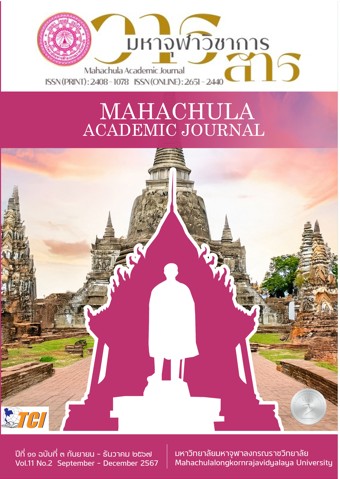The Effects of Learning Management based on Five Practices of Stein et al.’s Model on Mathematical Concepts and Communication Ability of Mathayomsuksa 3 Students
Main Article Content
Abstract
The purposes of this research were; (1) to compare mathematical concepts of Mathayomsuksa III students after using learning management based on five practices of Stein et al.’s model with the criterion 70% and (2) to compare mathematical communication ability of Mathayomsuksa III students after using learning management based on five practices of Stein et al.’s model with the criterion 70%. The sample were 44 students of Mathayomsuksa III students of the second semester in academic year B.E 2566 they were selected by cluster random sampling method. The research instruments used in this research consisted of; (1) five lesson plans on linear inequalities in one variable, (2) Mathematical concepts test, with the reliability of 0.81, (3) Mathematical communication abilities test, with the reliability of 0.71. The statistical for analyzing the collected data were percent, mean, standard deviation and t-test for one sample.
Research results were that; (1) Mathematical concepts of Mathayomsuksa III students after using learning management based on five practices of Stein et al.’s model was higher than the set criterion of 70% at .05 level of statistical significance. (2) Mathematical communication ability of Mathayomsuksa III students after using learning management based on five practices of Stein et al.’s model was higher than the set criterion of 70% at .05 level of statistical significance.
Article Details

This work is licensed under a Creative Commons Attribution-NonCommercial-NoDerivatives 4.0 International License.
References
๑. กรมวิชาการ. การแก้ปัญหาคณิตศาสตร์. กรุงเทพมหานคร : โรงพิมพ์คุรุสภาลาดพร้าว, ๒๕๔๔.
๒. กระทรวงศึกษาธิการ. ตัวชี้วัดและสาระการเรียนรู้แกนกลาง กลุ่มสาระการเรียนรู้ คณิตศาสตร์ (ฉบับปรับปรุง พ.ศ. ๒๕๖๐) ตามหลักสูตรแกนกลางการศึกษาขั้นพื้นฐาน พุทธศักราช ๒๕๕๑.กรุงเทพมหานคร : โรงพิมพ์ชุมนุมสหกรณ์การเกษตรแห่งประเทศไทย, ๒๕๖๐.
๓. ทรรศมน วินัยโกศล. “ผลการจัดกิจกรรมการเรียนรู้คณิตศาสตร์ตามโมเดลของสไตน์ที่มีต่อความรู้และความสามารถในการให้เหตุผลทางคณิตศาสตร์ของนักเรียนมัธยมศึกษาปีที่ ๓”. วิทยานิพนธ์ปริญญามหาบัณฑิต. กรุงเทพมหานคร : จุฬาลงกรณ์มหาวิทยาลัย, ๒๕๖๑.
๔. กิตติ พัฒนตระกูลสุข. “การเรียนการสอนคณิตศาสตร์ในระดับมัธยมศึกษาของประเทศไทยล้มเหลวจริงหรือ”. วารสารคณิตศาสตร์. ปีที่ ๔๖ ฉบับที่ ๕๓๐–๕๓๒ (กันยายน–ธันวาคม ๒๕๔๖) : ๕๔–๕๘.
๕. นาตยา ปิลันธนานท์. การเรียนรู้ความคิดรวบยอด (Concept Learning). กรุงเทพมหานคร : เจ้าพระยาระบบการพิมพ์, ๒๕๔๒.
๖. เวชฤทธิ์ อังกนะภัทรขจร. ครบเครื่องเรื่องควรรู้สำหรับครูคณิตศาสตร์: หลักสูตรการสอนและการวิจัย. กรุงเทพมหานคร : จรัลสนิทวงศ์การพิมพ์, ๒๕๕๔.
๗. สถาบันส่งเสริมการสอนวิทยาศาสตร์และเทคโนโลยี. ครูคณิตศาสตร์มืออาชีพ เส้นทางสู่ความสำเร็จ. กรุงเทพมหานคร : บริษัท ๓–คิว มีเดีย จำกัด, ๒๕๕๕ก.
๘. สถาบันส่งเสริมการสอนวิทยาศาสตร์และเทคโนโลยี. ทักษะและกระบวนการทางคณิตศาสตร์. พิมพ์ครั้งที่ ๓ แก้ไขเพิ่มเติม. กรุงเทพมหานคร : ๓–คิว มีเดีย, ๒๕๕๕ข.
๙. สุวัฒนา เอี่ยมอรพรรณ. วิธีและเทคนิคการสอนคณิตศาสตร์เพื่อพัฒนาการคิดสำหรับครูในยุคปฏิรูปการศึกษา. กรุงเทพมหานคร : โรงพิมพ์แห่งจุฬาลงกรณ์มหาวิทยาลัย, ๒๕๔๖.
๑๐. Barrody, A. J. and Coslick, R. T.. Problem solving, reasoning and communicating, K-12: Helping children think mathematically. New York : Macmilan, 1993.
๑๑. Cai, J. & Lester, F.. “Why is teaching with problem solving important to student learning?”. The national council of Teacher of Mathematics. vol. 13 No.12 (April 2010) : 1–6.
๑๓. Groth, R. E.. “Using the five practices model to promote statistical discourse”. Teaching Statistics. vol. 37 No.1 (June 2014) : 13–17.
Hughes, K.E.. “Lesson planning as a vehicle for developing pre-service secondary teachers' capacity to focus on students' mathematical thinking”. Education dissertation. University of Pittsburgh, 2006.
๑๔. Jamar. “High expectations: A "how" of achieving equitable mathematics classrooms”, Negro Educational Review. vol. 56 No.2 (July 2005) : 3.
๑๕. Johanning I. Debra. “An analysis of Writing and Post writing Group Collaboration In middle School Pre-Algebra”. School Science and Mathematic. vol. 100 No.3 (March 2000) : 151–160.
๑๖. Kennedy, L. M., and Tipps, S.. Guiding children's learning of mathematics. California : Wadsworth, 1994.
๑๗. Kinard, T. and Kozulin, A.. Rigorous Mathematical Thinking: Conceptual formation in the Mathematics classroom. Cambridge : Harvard University Press, 2008.
๑๘. Klausmeier, H. J., and Ripple, R. E.. Learning and human abilities. New York : Harper International Edition, 1971.
๑๙. Mumme, J., and Shepherd, N.. Communication in Mathematics In Implementing the K-8 Curriculum and Evaluation Standards. Virginia : The national council of Teacher of Mathematics, 1993.
๒๐. Stein, M. K., Engle, R. A., Smith, M. S., & Hughes, E. K.. “Orchestrating productive mathematical discussions: Five practices for helping teachers move beyond show and tell”. Mathematical Thinking and Learning. vol. 10 No.4 (October 2008) : 313–340.
๒๑. Stigler, J. W., Gallimore, R., and Hiebert, J.. “Using video surveys to compare classrooms and teaching across cultures: Examples and lessons from the TIMSS video studies”. Educational Psychologist. vol. 35 No.2 (June 2000) : 87–100.
๒๒. The National Council of Teachers of Mathematics. Principles and standards for school mathematics. vol. 1, Virginia : The national council of Teacher of Mathematics, 2000.
๒๓. The National Council of Teachers of Mathematics. Principles to Actions: Ensuring Mathematical Success for All Produced. (Virginia : The national council of Teacher of Mathematics, 2014.
๒๔. Williams, D.. "Development Reading Comprehension Skills at the Post Primary Level". Forum. vol. 21 No.3 (July 1983) : 251–255.
๒๕. สถาบันทดสอบทางการศึกษาแห่งชาติ. คู่มือการจัดการทดสอบทางการศึกษาระดับชาติขั้นพื้นฐาน (O-NET) ศูนย์สอบ. [ออนไลน์]. แหล่งที่มา : www.niets.or.th [๑๖ มกราคม ๒๕๖๕].
๒๖. สถาบันส่งเสริมการสอนวิทยาศาสตร์และเทคโนโลยี. ผลการประเมิน PISA 2018 การอ่านคณิตศาสตร์และวิทยาศาสตร์. [ออนไลน์]. แหล่งที่มา : http:/www.ipst.ac.th [๑๒ มกราคม ๒๕๖๕].


